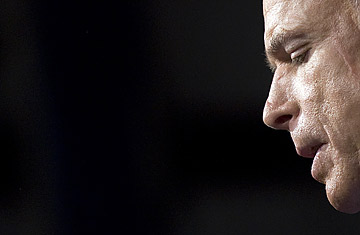
Republican presidential candidate Senator John McCain during a rally in Downingtown, Pa.
(3 of 3)
McCain Stuck with Attacks That Depended on Dominating the News Cycles. The McCain campaign strategy called for an aggressive endgame: raising key questions about Obama's readiness for office. But when the time came to unleash the harsher attacks concerning former domestic terrorist William Ayers, ACORN, troop funding and abortion, they seemed like small distractions. The financial crisis had overwhelmed the news cycle, making issues like house payments and job security far more important than Obama's less flattering associations or alleged character flaws. As a result, a strategy that might have found more success in another time fell flat. And with McCain's poll numbers already sinking on news of the economy, his harsh messages and attacks began to look increasingly desperate, fueling negative perceptions of his candidacy.
McCain Stopped Having Fun. Unlike many politicians, McCain's always depended on his rascal side, his inner mischief maker, to woo voters. This was the "maverick," the image that America fell for during the 2000 campaign. It wasn't just McCain's candor that mattered — the so-called straight talk — it was the Rat Pack pizzazz that accompanied it. McCain was the guy who enjoyed the fight. Since the spring, however, that McCain has been hard to find, the result of a conscious, misguided decision to keep him on message and avoid unpredictable encounters. By isolating himself from the press, McCain lost his natural audience, and his frustration has begun to grow. He now appears the beleaguered, sometimes frustrated fighter, an inherently less optimistic and less appealing personality.
